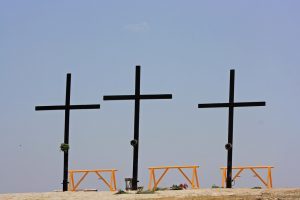Gary Neal Hansen's Blog, page 29
October 29, 2018
After the Tree of Life Synagogue Massacre

 Vigil after Tree of Life Synagogue Massacre (Photo from WESA 90.5 website)
Vigil after Tree of Life Synagogue Massacre (Photo from WESA 90.5 website)Monday Morning
I’m at the Starbucks at the corner of Forbes and Shady. I walked here from my home in Pittsburgh’s Squirrel Hill neighborhood. On the way I passed two very grand synagogues. If I’d walked a few blocks further I’d be at the Tree of Life.
I wore black. During services Saturday services a man entered the Tree of Life synagogue and murdered 11 people.
Many mornings I would instead be a block down Forbes at the Jewish Community Center — I walk the track and write, telling stories into a digital audio recorder. But today the JCC is closed. The FBI and trauma responders are using the space as a base for investigation and comforting the grieving.
There is often a crowd of teens here before and after school, hanging out on their way to or from one of the Jewish high schools, Hillel Academy I think, but I’m not sure. I enjoy seeing them. I’m sure they have all the ordinary problems, but they always look squeaky clean and full of hope.
Today instead there is a group in uniform shirts, jackets, and backpacks with logos reading “United Hatzalah.” Some wear Israeli flag patches, though others are from Cleveland or elsewhere. They are volunteers providing emergency services to the community.
They’ve come a long way to help.
Look for the helpers,” said Mr. Rogers.
When the unspeakable happens, when the world seems askew because the holy has been desecrated, there will be people trying to help.
Light will shine even in the midst of darkness. That doesn’t take the horror away, but it helps you get through it.
Saturday’s Massacre
My son and I were across the river when it happened. I picked up two references to an “active shooter in Squirrel Hill” on social media.
I called my wife to make sure she and my daughter were safe. I kid you not, she and our daughter were sitting on the couch watching an old episode of “Mr. Rogers’ Neighborhood.”
When we moved here, one selling point for the kids was that we were moving into Mr. Rogers’ actual neighborhood. The Presbyterian saint of kindness and gentle love lived in Squirrel Hill.
So in addition to the unfolding story of yet another mass shooting, yet another hate crime, yet another act of anti-Semitism, there was the surreal irony that it happened in Mr. Rogers’ Neighborhood.
That surreal irony, however, is the least of the problems.
There are 11 people dead.
There are the shattered congregations who meet to worship and pray in Tree of Life.
There are all the many other Jewish congregations in Pittsburgh.
There are the many Jewish people in the city who are disconnected from faith communities.
There are the countless Jewish communities and individuals around the world.
All of them must be shaken, feeling the grief of such an act of hate. I imagine it is hard work to deal with the fear.
If someone is moved to come into that place of worship and kill, don’t the people in this place of worship have to wonder if we are next?
And it is not only the Jewish community that is wounded by this act.
Every community that suffers for being different from other communities gets another brick added to the wall of fear. Might they not be next? After all, you don’t have to look too far into the past to find massacres in churches, mosques, temples, nightclubs…
It goes beyond the Mr. Rogers irony to deep desecration:
The Jews are people deeply concerned with living according to God’s good and holy law.
“Thou shalt not kill” is up there in the Top Ten.
Then comes Saturday, and a man is so twisted up with hate that he comes into
a place devoted to worshipping the God who said “Thou shalt not kill,”
finds people who are living by the law “Thou shalt not kill,”
and he kills them.
Those days 2000 years ago
There are people, it seems, who give themselves over to darkness and evil. Or perhaps darkness and evil have taken them over — back in Jesus’ day he encountered many who were “possessed by evil spirits.”
We Christians tend to dumb this down a bit. Some of us talk about “spiritual warfare,” but we think it is about tiny little things.
One time some people looked at Jesus’ acts of love, healing the sick, feeding the hungry, welcoming outcasts, and casting out demons, and they said he did those things by the power of Satan.
They looked at true goodness and called it evil.
That’s when Jesus spoke of “blasphemy against the Holy Spirit,” and seemed to say it was beyond forgiveness.
Let’s at least expand our concept of “spiritual warfare” to include people who set out to hurt others with everything from words on the internet to automatic weapons.
The world is not all black and white. But growing in God’s image and likeness includes learning to distinguish good from evil.
And people who confuse the two, mistaking their own acts of evil for good, are in a terrible state indeed.
Saturday’s Vigil
I’ll tell you something that gave me hope.
Saturday evening, less than twelve hours after the murders, there was a vigil at the corner of Forbes and Murray, the center of Squirrel Hill’s “downtown.” It was organized by Jewish teenagers from the neighborhood’s public high school, Taylor Allderdice.
We were there, a few feet from where the photo was taken, with a crowd estimated in the thousands.
The kids’ words were heartfelt. Not polished. Eloquent in their simplicity. Grieving, wanting to do something to help. Wanting not to be alone.
Then they did an amazing thing.
It was sundown up above the drizzling clouds. That marked the end of the Sabbath, the turn from holy time to the ordinary week. They said they were going to do what all observant Jews do at that time: the ritual called “Havdalah,” the leave taking of the Sabbath.
So there, with a crowd that surely included hundreds of non-Jews, they sang the Hebrew songs of Havdalah. We sang along with them, as best we could.
It was beautiful as an act of courage.
On a day when 11 were killed for doing what Jews do, these high schoolers stood up and showed that no one would stop them from being Jews. Out in front of the world, no matter what the world thought, they sang their love for God and neighbor.
It was beautiful as an act of hospitality.
While Jews have historically often been shoved away into ghettos, and when one could not possibly blame them for hunkering down away from society, these teenagers invited the world in. We non-Jews were drawn into the song, blessed along with the Jewish community for Sabbath rest and the workweek ahead.
Sunday Morning
The next morning I walked with my family into a Christian church, late as usual, while the congregation sang Martin Luther’s “A Mighty Fortress is our God.”
I found my place in the hymnal just in time to join the final verse,
Let goods and kindred go,
This mortal life also;
The body they may kill:
God’s truth abideth still,
His Kingdom is forever.
I sang it loud, as a protest against the darkness, with a heavy heart and a quavering voice.
So let’s stick to loving our neighbors, okay? Like instead of killing them.
Maybe we could even commit to only speaking in loving ways on social media.
The post After the Tree of Life Synagogue Massacre appeared first on Gary Neal Hansen.
October 24, 2018
Monday Meditation: RCL Year B, 30th Sunday in Ordinary Time, Mark 10:46-52

 William Blake –Christ Giving Sight to Bartimaeus (Public Domain)
William Blake –Christ Giving Sight to Bartimaeus (Public Domain)The Gospel assigned for the 30th Sunday in Ordinary Time (Mark 10:46-52) picks up where the previous week’s Gospel left off.
Mark 10:46-52
It is a story I’ve always been drawn to: Bartimaeus, the blind man, calls out to Jesus for mercy and receives his sight.
My interest is grabbled by unexplained oddities, emphatic repetitions, and tiny but moving details.
Unexplained Oddities
First among the oddities: the travel itinerary.
Right at the beginning they go to Jericho. It is such a famous biblical city — you know,
Joshua fit the battle of Jericho, Jericho, Jericho…
It seems like the location must be important.
But what does Jesus do in the famous city?
Nothing, really. At least nothing that made it into the Gospel.
As soon as they get there, in the very same verse, they leave.
Still, Mark may be hinting at something weighty.
That OT scene with Joshua? (Joshua, who basically has the same name as the Lord — Yeshua, Jesus.) Remember how the big miracle happened when Joshua took the whole vast company of Israel marching around Jericho, the priests and the ark leading, and the army following.
Is there a hint of that scene in the way Jesus left the city?
… he and his disciples and a large crowd were leaving Jericho…” (Mark 10:46 NRSV)
Then back in the OT story, after a week of marching around, the people were commanded, strangely, to “shout.” It was that shouting that triggered the miracle of the city’s fall.
Is there a hint of that in the way Bartimaeus got Jesus’ attention?
He shouted, and then he shouted even more loudly,
Jesus, Son of David, have mercy on me!” (Mark 10:47-48 NRSV)
It is a tenuous connection, but I like it. If I were a 4th century Church Father, or a medieval monk, I’d surely weave it into a groovy spiritual lesson: As we march out from the city of our sin, we too should shout to Jesus, to catalyze the miracle we need — the walls we have build around ourselves, that keep us as blind as Bartimaeus, will fall and we will see God truly, and live in spiritual freedom.
Something like that. That’s a nice twistable metaphor for spiritual life. It’s good for my prayer time — but it probably won’t preach. Not, at least, without some serious meditative work and probably a poet’s sensibilities.
Emphatic Repetitions
I am also drawn to Bartimaeus’ emphatic repeated shout:
Jesus, Son of David, have mercy on me!” (Mark 10:47 NRSV)
And then, when people tried to silence him, even louder:
Son of David, have mercy on me!” (Mark 10:48 NRSV)
It is (spoiler alert) a prayer that got answered.
It has also become one of the great biblical models for prayer. Many centuries ago, among the monastics of the Christian East, this biblical prayer became the heart of the practice called the “Jesus Prayer.”
It is most frequently quoted as
Lord Jesus Christ, Son of God, have mercy on me, a sinner.
You can see that Bartimaeus’ prayer forms the backbone here.
It’s more ancient basic form shows Bartimaeus’ prayer even more clearly:
Lord Jesus Christ, Son of God, have mercy on me.”
The Orthodox, like Bartimaeus, repeat this prayer — they do it endlessly. It isn’t that they think they will be heard for sheer volume or because of saying it so many times. No. It is more a practice that distills prayer to its essence and forms our hearts to peaceful dependence on Christ.
But I think also that they are convinced by this biblical story. They know that when Bartimaeus asked for mercy, and asked again, Jesus drew him near. And Jesus gave him precisely the mercy he needed.
Tiny but Moving Details
That interaction with Jesus, after Jesus heard Bartimaeus ask for mercy is the place where the tiny details are found.
First, Jesus asks the tantalizing question:
What do you want me
to do for you?” (Mark 10:51 NRSV)
I’m by no means the first to think about this question as something weighty.
A lot of people emphasize the “What do you want?” part of this: as if the key thing is that Jesus gets Bartimaeus to name precisely what he wants.
But there is a way of emphasizing this that gives me the weebie jeebies. By implication, we poor fools who don’t get our prayers answered just didn’t ask clearly enough.
To me the significance of the question is in the relationship it establishes. There is a “me” in parallel with the “you,” an “I” as well as a “thou.” Jesus treats Bartimaeus with genuine respect, as a real person.
Jesus may not give everyone everything they ask for — we saw that last week, when he refused to grant James and John’s request to sit beside him in glory.
But Jesus does honor everyone who asks, relating to them with integrity and genuine love. That love, that respect, that honor are things high on the list when it comes to descriptions of the mercy we need.
Second, there is the final instruction after the healing, and Bartimaeus’ strange way of complying.
Go; your faith has made you well.”
Said Jesus.
Immediately he regained his sight
and followed him on the way. (Mark 10:52 NRSV)
So Jesus said “Go!” but the guy stuck around instead. He stayed, as a follower of Jesus.
But then, Jesus was in the process of leaving Jericho. Jesus himself was going. He who is the Way was on his way. Anyone who followed him was on the way — “going,” you might say.
So by staying near, Bartimaeus obeyed the command to go. That’s a paradox worthy of meditation.
Learning from Bartimaeus
Personally? I’ll learn all I can from Bartimaeus. I’ll keep praying the Jesus Prayer. Jesus grants mercy every time.
++++++++++++
Sometimes it can even take till Wednesday to bring out a “Monday Meditation.” That’s partly because I like to spend time with the text. Good things happen slowly.
If you’d like to explore an ancient way of taking Scripture slowly, think about signing up for my Advent course on the classic spiritual practice of Lectio Divina, the prayerful meditative approach to integrating God’s Word.
Click the button for full info and to get on the waiting list…
The post Monday Meditation: RCL Year B, 30th Sunday in Ordinary Time, Mark 10:46-52 appeared first on Gary Neal Hansen.
October 18, 2018
Letters to a Young Pastor: The Children’s Sermon — Metaphors

 U.S. Air Force photo by Jason Minto/Released
U.S. Air Force photo by Jason Minto/ReleasedDear ______:
Sorry I haven’t written for a while. I launched a new class, and that took my attention from most other things. But it sounds like in your field education position you are getting to continue your thinking about children’s sermons.
As you wrote,
My supervisor has a unique way of doing his children’s sermon. He comes out each week with a bag of objects. He doesn’t know what’s inside. Members of the congregation have fun putting things in there for him. His challenge is to reach in, bring out an object, and make it the center of his children’s sermon. The congregation loves it!
Ah yes. The random Metaphor Generator.
Actually, your supervisor’s approach is not unique. I’ve seen it done and heard of many who do it.
Personally I don’t recommend it.
And when I say
I don’t recommend it
what I really mean is
Please, never do this, ever.
Why do I object so strongly to what your field ed congregation adores? Several reasons.
I tremble to take on this topic, though, since a bunch of pastors whom I like and respect do the random grab bag children’s sermon at least from time to time. (I don’t want to offend them, so be sure you don’t share this letter with them, okay?)
I’ll take the most important one first, just in case you are tempted to let your eyes glaze over as I rant.
1. The grab bag sermon will almost always completely fail to communicate with children.
Here’s the thing: Every “object lesson,” especially when it comes from a grab bag, is about a metaphor. And little kids can’t actually grasp metaphors — they can’t do it reliably till they are maybe 8 or 9. (I say “reliably” because sometimes one will get through earlier.)
If you pull something random out of the bag (maybe a wrench?), no matter how clever you are in building a metaphor from it about the Christian life (“God uses other people to help us grow like we use tools to tighten nuts and bolts”) the kids can’t make the leap.
Once a pastor I dearly love brought a bunch of peppercorns out for the children’s sermon and talked about how hot they were if you bit down on them. There was a hearty gospel point of some kind being made of course, but after church we asked the kids,
So what do you think the children’s sermon was about today?
They offered a theory:
Don’t eat pepper?
And we grown ups use a TON of metaphors even when we aren’t doing object lessons. (Did you spot the metaphor in that sentence? It’s a weighty one.)
Anyway, if you use language in your children’s sermon that 7 year olds can’t grasp, then you’ve missed your target.
2. The grab bag sermon will almost never do what every sermon is supposed to do.
If you are aiming for that time with the kids up front to be a children’s sermon, you need to remember what every sermon needs to do: It needs to help people understand and live in light of the message of Scripture. In particular it needs to help people into the passage of Scripture read in worship that morning.
And the grab bag? It’s about making something spiritual or gospel-ish out of some random item. I think the odds of it helping the kids understand that morning’s text are minimal.
3. The grab bag sermon’s primary benefit is the entertainment of the grown-ups.
Parents love the grab bag sermon. It’s like going to an improv club and shouting out some random thing that the actors have to incorporate in a scene.
We enjoy sweating with the pastor who has to convey a Christian message from a plastic spider. Or a tea cozy. Or whatever.
And then we feel satisfaction when he or she pulls it off. It’s entertaining.
But the point is not to entertain the adults. The point is to communicate the Christian faith to the children.
4. The grab bag sermon’s secondary benefit is helping the pastor feel like a champ.
Pastors probably love the grab bag children’s sermon even more than the grown ups. Pastors often love to perform, to ham it up a bit. We love approval and admiration.
Even if the congregation doesn’t approve of applause, we love to congratulate ourselves when we really do come up with a gospel meaning based on an empty balloon, or an old light bulb.
Woo hoo! Yes! (Inner fist pumps the air in triumph.)
But that’s not the point, right? The children’s sermon, like the grown-up’s sermon, is part of worship. It isn’t intended to make the pastor feel good — nor is it, in fact, to make the people feel good.
The point of everything in worship is to draw us toward God.
Take another page from Mr. Rogers’ playbook.
If you want a good exercise in improving your children’s sermon, try this: Find a colleague from another church, and each of you write our your children’s sermon verbatim. If the service is taped, just transcribe it word for word. Then trade children’s sermons with your friend and see if you can circle every single metaphor.
Then, when you see your marked up copy, go through it and see if you can rephrase every sentence to make it completely metaphor free.
That kind of seriousness about simple, child-level language is one of the things to learn from Mr. Rogers. He wrote and edited his scripts to make sure he was speaking plainly and honestly. When he fed the fish, it wasn’t a metaphor. It was one of the things he did in his TV house.
Next time you do a children’s sermon give it a try. Let me know how it goes!
Blessings,
Gary
++++++++++++
My Letters to a Young Pastor are an ongoing semi-regular series here on my blog. I’d love to send them to you so you never miss a single one. Just scroll down to the black box with the orange button to sign up for my weekly(ish) newsletter and they’ll come straight to your inbox.
The post Letters to a Young Pastor: The Children’s Sermon — Metaphors appeared first on Gary Neal Hansen.
October 16, 2018
Monday Meditation: RCL Year B, 29th Sunday in Ordinary Time, Mark 10:35-45

 CC by Ramon FVelasquez-SA 3.0
CC by Ramon FVelasquez-SA 3.0The lectionary omits three verses between week 28 (Mark 10:17-31) and week 29 of Ordinary time (Mark 10:35-45). It seems like an easy thing to skip: Just another prediction of Jesus’ coming passion and resurrection.
But the skipped bits are pretty crucial: Jesus’ prediction sets up James and John’s request about their place with Jesus in glory.
In this portion of Mark the passion predictions (sometimes omitted by the Lectionary) are interwoven with the injunctions about leadership and servanthood (mostly included). The combination seems important to Mark.
Mark 10:35-45
The story hangs together tightly, taking three interesting turns:
1. James and John make a truly honest prayer request.
2. Jesus instead gives them a great conversation
3. When the others complain, Jesus reminds them of the main point.
James and John Make a Truly Honest Request
I always smile when I hear James and John, those Sons of Thunder, burst forth with their little request. I particularly love the ramp-up:
Teacher, we want you to do for us whatever we ask of you.” (Mark 10:35 NRSV)
That, my friend, is honesty in prayer. None of the familiar Gethsemane hedging: “Not my will, but thine be done!”
No, this is straightforward human nature face to face with God. Every time I pray I want God to do whatever I ask of him.
It seems nearly universal. Take a look at the books on prayer that have been really big sellers in recent decades: A whole lot of what we want to know about prayer is how to get God to ANSWER and to answer with EXACTLY what we ask for.
We really like those bits in John’s Gospel where Jesus promises that God will grant whatever we ask in his name.
So I smile at James and John, caught on camera saying what I am generally afraid to admit that I mean.
Jesus seems to have found it amusing as well. The mic was a bit far from his mouth, so we miss him saying,
Yeah, you and everybody else.
But can’t you see his wry smile as he asks,
What is it you want me to do for you?” (Mark 10:36 NRSV)
Nothing much. Nothing here in this life — too humble for that. But Jesus talked about rising from the dead, and he’s said a lot about his coming kingdom.
So how about front row seats, Jesus? Could we sit at the main table, guests of honor, at the big final banquet?
Really they seem to be thinking longer term:
What we really want is to be honored forever, as your main dudes. We’ve got your back down here, Lord. How about you show everybody, for all eternity, that you like us best. Right and left. Up beside you. How about it, huh? Can we? Can we?
But hey, they were honest. That’s more than many of us can say about our prayer lives.
Jesus Gives Them a Great Conversation
John might have been disappointed that Jesus didn’t agree to the request. After all, John was all set to put those passages in his Gospel saying Jesus would do whatever we ask in his name.
But Jesus is not so compliant here in Mark.
The thing to notice, though, O you person of prayer, is that Jesus takes the question really seriously. He engages with James and John on a couple different aspects of what they have asked.
Jesus’ first point is actually that James and John haven’t taken their own question seriously enough:
You do not know what you are asking.” (Mark 10:38 NRSV)
he says simply enough.
And that’s a good word to all of us who take courage and speak to God about what we really want. We think we are on firm ground about our own needs and wants — but Jesus is likely enough to tell us that our little request is tied to something much bigger.
We just don’t know the implications, the unforeseen consequences to ourselves or to others. And so, as to James and John, Jesus tells us
No.
The conversation goes on, though. Jesus doesn’t stop at telling James and John that they don’t understand their own request. Jesus fully declares that he cannot actually give what they ask for.
…to sit at my right hand or at my left is not mine to grant,
but it is for those for whom it has been prepared.” (Mark 10:40 NRSV)
Which can be paraphrased as
Sorry — I actually can’t give you what you prayed for.
Jesus’ answer speaks to some of the intellectual puzzles of prayer. We are stymied at an all-loving, all-powerful God who promises to do what we ask — but doesn’t.
Jesus doesn’t deny that the Triune God could do what we ask. He just points out that the Triune God already has firm plans with regard to the topics we’ve brought up.
Most poignantly, we human beings frequently pray for the life of a loved one. But even if someone recovers from illness today, they will die of something, someday. That’s how God has arranged this world, and the nature of the life we have been given.
I wonder how often, if we could only hear him, Jesus responds to our urgent requests, “To do what you ask is not mine to grant,” and all because of the nature of the world God has created.
So Jesus tells us “No,” but first he invites us to come near, he invites us to speak, and he genuinely listens to us.
In fact, the nature of prayer is that one of the best things Jesus gives us is a great conversation. That’s what he gave his friends James and John.
Jesus Reminds Them All of the Main Point
As happens in every little community, the other ten found out what James and John had been asking Jesus about.
The ten were bugged. I suppose it was about James and John’s brazen grab for eternal superiority. Or maybe it was just the usual tendency of gossip to bring out the acidic judgmental quality of our hearts.
Anyway, Jesus doesn’t give it the time of day. He reminds all twelve apostles of what he’s emphasized for passage after passage.
To be great in his kingdom is to be a servant of others. The more you serve the greater you are.
And that is something, he points out, he has been modeling for them for a good long while:
For the Son of Man came not to be served but to serve…” (Mark 10:45 NRSV)
And it is something, he hints yet again, that is going to be fulfilled in the passion and resurrection he’s been predicting:
For the Son of Man came … to give his life a ransom for many.” (Mark 10:45 NRSV)
And being like Jesus is the main thing, right? Even if we get there slowly, by the Holy Spirit’s gradual transformation and our sometimes grudging participation.
++++++++++++
Sometimes it takes till Tuesday to bring out a “Monday Meditation.” That’s partly because I like to spend time with the text. Good things happen slowly.
If you’d like to explore an ancient way of taking Scripture slowly, think about signing up for my Advent course on the classic spiritual practice of Lectio Divina, the prayerful meditative approach to integrating God’s Word.
Click the button for full info and to get on the waiting list…
The post Monday Meditation: RCL Year B, 29th Sunday in Ordinary Time, Mark 10:35-45 appeared first on Gary Neal Hansen.
October 10, 2018
Monday Meditation: RCL Year B, 28th Sunday in Ordinary Time, Mark 10:17-31

 Hoffman: Christ and the Rich Young Ruler
Hoffman: Christ and the Rich Young RulerWhen I first started writing these Monday Meditations I was surprised how the readings often seemed patched together. Now I’m surprised to find one that’s a coherent story — as is the case in the Gospel for the 28th Sunday in Ordinary Time.
Mark 10:17-31
It is a nuanced conversation on the topic of wealth and discipleship. There are days and days of meditation in here (or weeks and weeks of sermons).
There are really three parts to Mark 10:17-31, three conversations, each taking its own surprising turn:
1. A rich man runs up to ask about eternal life, and eventually Jesus tells him to sell his possessions and give to the poor — which he won’t do.
2. Jesus chats with his friends about how hard it is for the rich to enter God’s kingdom — but it’s not impossible for God.
3. Peter points out how the disciples have already done what Jesus asked of the rich guy — and Jesus says doing so they’ve gained a hundred times more, both here and in the next world.
The Rich Guy
I find I’m most captivated by the first of these conversations. It is peppered with unexpected bits.
First, Jesus starts off by being a bit flippant.
“Good Teacher…” said the man, and Jesus won’t let him get beyond that point:
Why do you call me good? No one is good but God alone.” (Mark 10:18 NRSV)
The man does not respond. Jesus doesn’t comment further. Mark, our narrator, whispers nothing from the wings.
It just hangs there: a claim that calling Jesus “good” is calling Jesus “God.”
John’s Gospel makes that kind of point much more often and much more directly. Mark seems to want us to ponder it, to come to our own conclusions.
Second, Jesus sneaks in a subtle bit of personal application.
After Mark’s minimal description of the guy (he is a man, and he is rich) the conversation tells us that he is a faithful keeper of the commandments.
That’s all we get — but it’s a serious mark of faithfulness. God gave the people of Israel the covenant, the Ten Commandments, as the shape of faithful life as the people of God. This guy does it.
But when Jesus answered the man’s question about the way to eternal life, he cited fully half of the decalogue.
That’s half the decalogue, plus a telling addition:
You shall not defraud.” (Mark 10:19 NRSV)
There are a number of relevant commands in the Pentateuch. But it isn’t in the passages Jesus was paraphrasing.
Maybe Jesus suspected that this fellow had some hidden issues living by God’s commandments. No outright stealing, sure, but maybe a bit of fraud here and there — some false measures, some cheating of his customers, some falsified reports filed with the government, whatever.
Anyway, Jesus adds “do not defraud” to his summary of the commands. Jesus doesn’t accuse him. Jesus just sort of nudges him. Kind of like the Holy Spirit, right?
Still, the man claims he’s fine. He’s kept all these from childhood.
Cha ching! Does that mean he has eternal life?
Well, maybe not, but Jesus isn’t ready to say so yet. First he has to do something very important. It’s after our third unexpected bit:
Third, Jesus doesn’t get judgy.
Jesus, looking at him, loved him…” (Mark 10:21)
I really like that. I mean, that just about melts me. Mark makes sure we see something quiet, something we might have missed even if we were standing right there at the time.
Jesus looked straight at the man. But he didn’t look at him the way Christians often look — you know, like when we are trying to argue a non-Christian into converting, or trying to fix the politics of a misguided Christian on Facebook.
Jesus looked at the man with eyes of love.
Jesus saw the man as he was and he kept looking.
Jesus had something more to say, but it wasn’t going to come as criticism.
It was an invitation. Really.
You lack one thing;
go, sell what you own, and give the money to the poor,”
And what will be the consequence of accepting that invitation?
…and you will have treasure in heaven;…”
So are we to think that giving to the poor, or selling all your possessions, is the answer to the original question? Is that the way to “inherit eternal life?”
Actually no. That’s just the second step in the journey.
First step: basic obedience to God’s basic commands.
Second step: detach from your stuff, you rich kid you.
Detach from following your wallet around. Like give it away.
Then we get the third step:
…then come, follow me.”
I love the parallelism in Jesus’ words to the rich guy:
… go,
sell what you own, and give the money to the poor,
… then come,
follow me.”
And that’s the answer to the question.
Eternal life? It’s following Jesus.
Do what you need to to be free enough to follow.
Then be on the journey with the Good Teacher who really is God.
That’s real life, now and in eternity.
++++++++++++
Hey, my new class “Pray Like a Reformer” is still open for registration through this Friday! I hope you will check it out. It’s going to be really fun…
The post Monday Meditation: RCL Year B, 28th Sunday in Ordinary Time, Mark 10:17-31 appeared first on Gary Neal Hansen.
October 3, 2018
Monday Meditation: RCL Year B, 27th Sunday in Ordinary Time, Mark 10:2-16

 Just Divorced (public domain)
Just Divorced (public domain)On the 27th Sunday of Ordinary Time, the Revised Common Lectionary gives us another chunk of Mark with two very different stories.
Mark 10:2-16
The temptation in Mark 10:2-16 is to let one story swamp the other. For the preacher it probably makes sense to choose just one. That’s probably the way to a coherent sermon.
Some will focus on the discussion of divorce (Mark 10:2-12).
Others will focus instead on Jesus blessing the children (Mark 10:13-16).
It is sorely tempting to make the choice out dodgy motives: Either from a desire to take a hard line of divorce or to avoid such a dicey topic.
Still others will assume some kind of divine inspiration on the part of the lectionary committee, and insist the two must be examined together.
Personally, I think it takes some stretching to read a text like this as one coherent passage. But they are both there in the Gospel. Even if we aren’t prepping a sermon, we Christians need to deal with both stories.
1. The Discussion of Divorce
Christians have made some pretty harsh policies based on the discussion of divorce here. Our reasoning seems to go like this: “Jesus says marital union is God’s plan from creation, and that divorce and remarriage is adultery; therefore all divorce must be forbidden.”
But Jesus is less of a lawgiver than we have made him out to be. (On this, see Paul, passim.)
So what is going on here?
Jesus is being tested. Those pesky Pharisees are after him again, poking, poking, poking with their questions.
The Gospels portray the Pharisees, remember, as the people who see righteousness in the perfect obedience to the law.
Lest we misinterpret the interaction, the New Testament generally disapproves of defining righteousness as perfect obedience.
So the Pharisees ask
Is it lawful for a man to divorce his wife?” (Mark 10:2 NRSV)
In the #MeToo era, I do wish Jesus had pointed out the one-sided quality of the inquiry. It comes across as a question about men and their power over women. But Jesus doesn’t go there.
The question is about the law, so Jesus has them look to the law for the answer.
Yes, they find, the law allows divorce.
Jesus sighed audibly, I’m sure, even if Mark didn’t record the fact.
Yes, the law allows it, Jesus notes, but the law is often about dealing with the consequences of deep ongoing problems.
Because of your hardness of heart he wrote this commandment for you.” (Mark 10:5 NRSV)
Ah yes. As always, Jesus turns the tables. But before you think he just toughened up the standard by negating the law’s permission of divorce, look again.
They came with an issue of legal permission — a law that solves a human problem.
Jesus emphasized instead the ideal state — the created state, before sin ruined everything.
Originally divorce was not to be needed. The promises made were intended to be permanent.
Then came sin and damaged lives. When the promises of marriage are nullified by broken people, further brokenness follows. (That’s the “adultery” part of the passage.)
Jesus pointed out the fallen state — “hardness of heart” he calls it, our condition after sin ruined everything.
We think that sin ruined our relationships — making divorce necessary.
Jesus points out that sin ruined our inner selves — leading to the actions we took, the attitudes we copped, that ruined our relationships.
(John Gotten, who uses actual scientific analysis to understand why marriages succeed and fail calls these attitudes and actions “the four horsemen of the apocalypse”: criticism, contempt, defensiveness, and stonewalling.)
The thing is, Jesus didn’t redeem us to make us better Pharisees.
And Jesus didn’t transport us back to the Garden of Eden, a pre-Fall state of pure and supple hearts.
No: We are still post-Fall, broken inside, destructive outside. We still have hard hearts.
Jesus isn’t toughening up the standard.
He’s telling us how the system was set up from the beginning.
He’s telling us how deep the problem is.
And he’s telling us that even with what we think is a solution, the damage keeps rolling out.
But you know — when it comes to the whole picture of life with Jesus, there is grace straight through it.
When God set it up we were intended to be capable of lifelong fruitful, joyful partnership.
When we messed it up, God allowed a stop-gap of divorce to keep the damage in check.
And the whole enterprise of salvation is always about God’s forgiveness of the damage we’ve caused, and new life growing in the wreckage.
In my first home I had great dreams of organic gardening. I started by making compost. All my kitchen waste went into the pile.
Alas I never got around to planting the organic garden. So what I had was a mess: a great big pile of garbage in the back yard.
But in my garbage, life bloomed.
I got a bumper crop of tomatoes and melons straight off the pile.
That’s how grace works. We make a mess. God creates new life right in the middle of it.
2. The Example of Children
I dearly love the second story here. (It goes to my lengthy series on children’s sermons.)
Some parents bring their kids to be with Jesus.
The grown-ups want to keep them away.
Jesus says to let them come — and he blesses them.
I’m guessing he played games and wrestled with them and generally had a ball, even if the text doesn’t go quite that far.
Then he makes a lovely statement:
Truly I tell you, whoever does not receive the kingdom of God
as a little child
will never enter it.” (Mark 10:15 NRSV)
It is also a kind of mysterious statement:
Is he saying to accept the kingdom by accepting a child?
Is he saying to accept the kingdom as if you were a child?
Perhaps the ambiguity isn’t there in the Greek. I’m not going to go looking today. I’m going to dwell with the possibility that it is the second option.
If I was to accept the kingdom as if I were a child, I could get totally over the hard words of the divorce passage.
A child doesn’t spend too much time on the hard questions.
A child doesn’t spend too much time avoiding grace because of feeling guilt and remorse.
A child accepts love because love is offered — and revels in it.
And that’s good news to Christians who struggle with their marriages, even when they end in divorce.
++++++++++++
I’m totally psyched to let you know that registration is now open for my new class “Pray like a Reformer!”
The post Monday Meditation: RCL Year B, 27th Sunday in Ordinary Time, Mark 10:2-16 appeared first on Gary Neal Hansen.
October 2, 2018
New Online Prayer Class: “Pray Like a Reformer”

I’m really psyched to announce that I’m offering a new online prayer class through this website. I’m calling it “Pray Like a Reformer,” and registration is open through Friday October 12, 2018.
Pray Like a Reformer

 Martin Luther and John Calvin were both passionate about prayer. They both thought it was basic to the authentic Christian life.
Martin Luther and John Calvin were both passionate about prayer. They both thought it was basic to the authentic Christian life.
Prayer builds the intimate connection with Christ that we need to live the life of faith in a challenging world.
Since Jesus himself commands us to pray, having a life of prayer is a basic form of obedience.
Prayer is the basic evidence that we have faith at all — you call out to God for help, and that shows you believe God is there and trust God will hear you.
Luther and Calvin will help you by drawing on core biblical teachings on prayer.
You’ll grow more confident in prayer, knowing that you are talking to God about things God wants you to talk about.
You’re conversation with God will be richer because you’ll learn to be more deeply honest in prayer.
An Online Prayer Class
This six-week online class is intended to jump start your prayer life by diving deep into the ways of prayer taught by these two most influential theologians of the Protestant Reformation.
If you are new to prayer, you’ll build solid foundations.
If your just need a fresh start, you’ll form helpful habits.
For the last couple of years I’ve taught online prayer classes in Advent and Lent. These are the seasons the Church emphasizes renewal — but they are sooooooo busy.
This class is offered in the fall, and will be done by Thanksgiving. That’s when you have time to focus on renewal.
What’s Inside?
Weekly video lectures.
Manageable fun readings. partly from my award winning book Kneeling with Giants: Learning to Pray with History’s Best Teachers.
Guided prayer “homework” totaling 15-20 minutes per day, putting into practice what Luther and Calvin teach.
A private discussion forum for encouragement and shared exploration of prayer.
And with the Premium Level, you get two one-on-one consultations with me on your prayer life and the course.
I hope you’ll check it out. It would be great to have you in the class! Click the button for full info:
The post New Online Prayer Class: “Pray Like a Reformer” appeared first on Gary Neal Hansen.
September 26, 2018
Monday Meditation: RCL Year B, 26th Sunday in Ordinary Time, Mark 9:38-50

 Which Way? CC by Mikhail Kryshen 2.0
Which Way? CC by Mikhail Kryshen 2.0Some passages seem intended to make us puzzle out which way to go. That’s okay. Study and meditation are holy processes, and they often bring clarity.
Week by week I find I’m struck by what one might call the “texture” of Mark’s Gospel. There is a big difference between the sweeping big picture and the granular up-close view.
Mark, Big Picture
When I was in seminary, a British actor came to town — I don’t remember his name — to perform a one-man show of the Gospel of Mark. He had memorized the whole thing in the KJV, and he simply recited it to us from the stage, vividly, with interpretive skill.
I was blown away by by the way Mark held together as a story, as a piece of literature. Repeated terms were obvious, and themes and emphases bubbled up. It was a powerful experience.
Mark, Close Up
But stopping to look closely at each week’s lectionary passage has the opposite effect. Within almost every week’s reading there is more than one story. In passages where he teaches, things that I’ve always thought of as various examples of a particular topic turn out to be substantially, or at least partially, unrelated.
Mark 9:38-50
This week, the 26th Sunday in Ordinary time in Year B, the lectionary Gospel is Mark 9:38-50. It breaks down into three discrete chunks.
Jesus discusses the fine points of recognizing supporters and opponents.
Jesus discussed various aspects of “stumbling.”
Jesus discusses the quality of “saltiness.”
1. Recognizing Supporters and Opponents
By the time we reach chapter nine, Jesus is enormously successful. Crowds regularly swarm him for healing as well as teaching. He’s known to cast out demons.
In this passage we get a window into an odd aspect of Jesus’ popularity and success: non-disciple exorcists have begun to invoke Jesus’ name to make demons leave.
Which is strange, you know? What would they say?
I don’t follow him, but by the power of Jesus begone!
The disciples tried to stop them.
Then the interesting thing happens: Jesus says to let the non-disciples go ahead and use his name.
It is explicitly self-protective: Jesus says that if someone uses his name for positive power, then that person won’t end up saying nasty things about him. (See verse 39.)
But it also grows from a similar root as last week’s text where accepting a child was functionally accepting Jesus and God.
For truly I tell you, whoever gives you a cup of water to drink because you bear the name of Christ will by no means lose the reward.” (Mark 9:41)
This verse twists it around a bit:
Jesus isn’t telling the disciples that they should accept someone else.
Jesus is telling them about when they, the disciples are accepted and served.
How do you tell who’s on Jesus side?
This topic of spotting who is and isn’t on Jesus’ side deserves a small excursus into the other synoptic Gospels.
Here in Mark it is very positive.
Whoever is not against us is for us.” (Mark 9:40 NRSV)
Over in Matthew, however, the Lord seems more negative.
Whoever is not with me is against me…” (Matthew 12:30 NRSV)
But then in Luke he is maybe of two minds.
On the one hand,
…whoever is not against you is for you.” (Luke 9:50 NRSV)
But on the other hand,
Whoever is not with me is against me…” (Luke 11:23 NRSV)
At first glance it seems contradictory. There is, however a path out of the labyrinth.
The way of wisdom is always about discernment rather than rigidity. There are, famously, sayings in the Book of Proverbs that directly contradict each other. They are not absolute rules, to be followed blindly.
Wisdom calls you to live in the love and fear of God. Then, a changed and wiser person, you will know which proverb applies in your particular situation.
That applies here. But the Gospels, read in context, make it clear that Jesus is actually describing very different situations.
Those who see Jesus’ deeds and credit the devil
In Matthew 12;30 and Luke 11:23, Jesus is dealing with those who accuse him of working by the power of Satan. If you are so misguided that you think healing the sick and caring for the outcast is evil, well then you simply aren’t on Jesus’ side.
Those who do things like Jesus, but don’t follow
In Luke 9:50 and here in Mark 9:40, Jesus is dealing with people who do exactly the kinds of things he does. They are casting out demons, curing an oppressive evil. He’s happy to have his name used for that — even by non-believers.
The upshot:
So… take a look at the world, O Christian, and see who wants to increase access to medical care. See who would support the refugee. See who would feed the poor.
Criticize them at your peril. If you aren’t with him, you are against him.
So… take another look at the world, O Christian. See who doesn’t stand with you as a Christian — but who helps bring sanity to the demon possessed, who tries to remove evil from our midst. See who brings healing to the sick, and food to the poor, and welcome to the outcast.
Criticize them at your peril. If they aren’t against him they are for him.
2. The issue of “stumbling”
In verse 42 we are wanted against putting stumbling blocks before others, especially children.
Then, in an almost-but-not-quite-poetic litany we are warned to take extreme action if our hand (verse 43), our foot (verse 45), or our eye (verse 47) causes us to stumble.
It’s hyperbole, people.
Before you show up in the emergency room for trying to follow the advice of 43, 45, or 47, think hard about the crux of the argument:
This is all about what “causes” you to stumble.
When you fall into sin, it isn’t the fault of your poor hand, foot, or eye. They don’t cause you to stumble. You use them in the process of stumbling.
What causes the stumbling? That would be your thoughts.
Evagrius of Pontus, the theologian among the Desert Fathers, had a great deal to say about this. I started a series on this, long ago, and if there is interest I’ll get back to it.
The call in Jesus’ obvious (darkly humorous) hyperbole is that we need to take a good hard look at our thinking. Root out the thoughts that cause our stumbling. They lead us to use all of our parts the wrong way.
3. The quality of “saltiness”
The little series of assertions about salt at the end are, to my mind, clumped together and rather cryptic.
You’re gonna be “salted with fire,” he says, and that doesn’t sound good.
(Sounds like a weighty metaphor…)
On the other hand salt “is good,” but unlike in my pantry where sodium chloride remains shelf stable, he indicates salt might “lose its saltiness.”
(Clearly another weighty metaphor… and in a different direction.)
On the third hand (which would obviously make it awkward to find shirts that fit) we are supposed to “have salt in ourselves” while remaining at peace with others.
(Which is a third, and different, weighty metaphor).
Exploring those three versions of salt would be the work of another day. I suspect that each one might be a proverb of sorts, applicable to a different life context.
Were I to say more I’d start by exploring the variety of other uses of “salt” in Scripture, as well as looking for New Testament passages on fire, loss of liveliness, and the difficulties of maintaining peace.
++++++++++++
I’d love to send my Monday Meditations to you… on Friday. Scroll down to the black box with the orange button and subscribe to my weekly(ish) newsletter and all my new articles and announcements will come straight to your inbox.
That includes the announcement very soon about the launch of my fall prayer class…
The post Monday Meditation: RCL Year B, 26th Sunday in Ordinary Time, Mark 9:38-50 appeared first on Gary Neal Hansen.
September 18, 2018
Monday Meditation: RCL Year B, 25th Sunday in Ordinary Time, Mark 9:30-37

 “Happy Children,” Ghana, CC by Borja Leston 2.0
“Happy Children,” Ghana, CC by Borja Leston 2.0On the 25th Sunday of Ordinary time the lectionary skips ahead most of a chapter to Mark 9:30-37. (A little bit of the skipped part came up earlier in the year: Mark 9:2-9 was the Gospel for the last Sunday before Lent, the Transfiguration.)
Last week in chapter 8 Jesus started predicting his passion and resurrection. That continues, in a slightly different mode, in the first part of chapter 9 with the Transfiguration and its aftermath.
Mark 9:30-37
Then we come to Mark 9:30-37. At a glance it looks like two stories:
Jesus teaches about his coming passion.
Jesus teaches that greatness comes through servanthood.
I find I’m not drawn to ponder the passion prediction. Clearly I’m not alone: The disciples were much more interested in talking about which of them was the greatest.
So my attention goes to verses 35-37. I’ve always read these as two parts of the same bit of teaching:
Jesus says the first must be last, and the greatest is the servant.
Jesus illustrates this by bringing in a kid.
As I lingered over this on Monday morning, it struck me that the second bit does not illustrate the first very well at all.
Take a look: Does what he says about the child have anything to do with going first, coming last, being great, or being a servant?
No. He switched topics. Mark doesn’t explain why.
So the lectionary passage is three stories stuck together, not two.
Jesus teaches (again) about his coming passion and resurrection.
Jesus says the greatest disciple is the servant of all.
Jesus says that welcoming children is welcoming him.
I’ll skip the passion prediction and consider these last two bits separately.
1. First and Last, Greatest and Servant
The disciples were so keen to establish their own importance. Jesus so wanted them to rethink the nature of importance.
Whoever wants to be first must be last of all and servant of all.” (Mark 9:35 NRSV)
If we were really wanting to go Jesus’ way, we would do as Jason Allen suggested. Jason is a friend in Canada who gave my wife some sage advice when she moved to the states:
When you go looking for a church you should join Last Presbyterian Church. That way, when Jesus comes again, you’ll get to be first.
As well as highlighting our eschatological hope, Jason’s comment points to an odd fact of history: we Presbyterians choose the most boring possible names for our churches. Not a marketing bone in our collective bodies. (Here in Pittsburgh they go at least as hight as “Sixth Presbyterian.”)
But I digress. Jesus’ words have a great deal to say, both to individual disciples and to churches. Most of us always need a reminder to pick up that towel and serve someone. That someone might be right in our home or workplace. They might be on our block or farther away.
But clearly Jesus favors taking action that lifts others up. I suspect we would do well with John the Baptist’s slogan,
He must increase, but I must decrease.” (John 3:30, NRSV)
Of course John was talking about Jesus.
But wait: Jesus said that what we do to the least of our neighbors we do to him. So… maybe seeking actively to be less so another can be more is right on target.
But don’t expect it to get you a promotion, or a new car or anything. We’re talking strictly about what Jesus wants from you.
Let’s face it though: it is much more natural to revel in being served.
2. Accept a Child, Accept Jesus
 “Palestinian children in Jenin” cc by Tarek-SA3.0
“Palestinian children in Jenin” cc by Tarek-SA3.0That’s one of the things that highlights the change of topic. I’ve spent some time around kids and a whole lot of them are not striving to serve others — until they are led to do so as a fun activity by some clever youth minister, teacher, or cub scout leader.
Some of the little kids I’ve seen are a bit more like those disciples who argued about which one is the greatest.
And in this passage Jesus doesn’t say “…so be like a little child.”
No. He’s talking about how we treat children.
He says
Whoever welcomes one such child in my name welcomes me, and whoever welcomes me welcomes not me but the one who sent me.” (Mark 9:37 NRSV)
Welcome a child, says Jesus, accept that child joyfully into your presence, and you are welcoming Jesus — and in doing that you are welcoming God, who sent Jesus.
That’s a really interesting bit of teaching, eh?
 “Mexican Children with OLPC XOs,” cc by Barnaby Dorfman 2.0
“Mexican Children with OLPC XOs,” cc by Barnaby Dorfman 2.0I think parents should be encouraged by this. Having responsibility for a baby, choosing to welcome a little child into this world and into your life, is a lot of work.
I don’t think anybody feels like they are first and greatest when they are changing a diaper.
But anybody who has kids around, in their neighborhood or their church, can do the same.
Just be kind to them. Welcome them. Let them know you are glad they are around.
Jesus says when we welcome that kid, whether a baby, a toddler, a pre-schooler, or a grade-schooler, then we are welcoming him — and God.
The Surprising Takeaway
Now I don’t think we get full marks for simply having a kid. I know that on my bad parenting days it doesn’t look much like really welcoming them.
Jesus took the child in his arms, he let the kid know that she was truly a delight, a welcome presence.
So that’s the surprising call of this passage.
Welcome the children. Let them be who they are. Enjoy them. Let them know they are wanted, valued, treasured.
As we welcome them and help them, realizing they are made in God’s own image, we welcome Jesus.
Sounds a bit like
love your neighbor as yourself.” (Mark 12:31 NRSV)
It just applies that great command to children.
And that isn’t bad parenting advice.
++++++++++++
My new online prayer class for Fall is coming really soon! One week of registration, six weeks of fun, practicing the best lessons of prayer from the most prominent Reformers of the 16th century…
I’d love to send you my Monday Meditations, as well as all my other new articles and announcements. Just scroll down to the black box with the orange button and subscribe to my weekly(ish) newsletter and they’ll come straight to your inbox.
The post Monday Meditation: RCL Year B, 25th Sunday in Ordinary Time, Mark 9:30-37 appeared first on Gary Neal Hansen.
September 11, 2018
Monday Meditation: RCL Year B, 24th Sunday in Ordinary Time, Mark 8:27-38

 CC by istolethetv 2.0
CC by istolethetv 2.0Most of this Sunday’s lectionary Gospel is making its second appearance this year:
The 2nd Sunday of Lent gave us Mark 8:31-38
The 24th Sunday of Ordinary Time has Mark 8:27-38.
(Mark 8:1-26 is left out in the cold, alas. I consider this an enormous loss. I’ll have to write on it some day — maybe it will be Tuesday Trepidation since the Monday Meditations are for what the lectionary leaves in.)
The thing to do would be to consider how verses 27-30 shape what follows. Back in Lent I wasn’t yet writing my Monday Meditations, so I’ve not previously considered verses 31-38 on their own. Still, I’ll give it a try.
Mark 8:27-38
The passage breaks down into three little scenes:
(1) 27-30: Jesus asks who people say he is; Peter says Jesus is the Messiah.
(2) 31-33: Jesus predicts the Son of Man will suffer, die, and rise; Peter rebukes Jesus so Jesus rebukes Peter.
(3) 34-38: Jesus says that his followers must lay down their lives and pick up crosses to follow him; lose self to gain all, or keep self and lose all.
An alternate structure
There is a logical thread connecting the three parts. In a sense, finding the thread means breaking down the units of the narrative differently.
(1) 27-29: The world says various things, but Peter rightly says Jesus is the Christ.
(2) 30-31: Jesus commands secrecy, but teaches openly on the coming suffering, death, and rising of the Christ.
(3) 32-34: When Peter rebukes Jesus for this open teaching, Jesus rebukes Peter, then makes a speech to the crowd about following Christ in the way of death.
(4) 35-38: Jesus goes on to discuss the economy of discipleship — keep your life and lose it vs. give your life (for Jesus) and gain it.
I have no idea whether that little structural analysis does anybody else any good, but I like it.
Peter rebukes Jesus
The oddity in the text is Peter’s rebuke of Jesus. Mark does not actually tell us the specifics. What did Peter find objectionable?
Is the problem that Jesus said the Messiah must suffer, die, and rise?
Or is the problem that he taught this so openly? Like, “Jesus, how come you just said we couldn’t tell that you are the Messiah and now you are teaching openly about this?”
(It is far clearer in Matthew: there Peter objects to Jesus’ teaching that Jesus himself must go to Jerusalem, suffer, die, and rise. It is about Jesus, not Mark’s theoretical “Son of Man” — and Peter says this must not happen to Jesus.)
The economy of the kingdom
To me, though, the really interesting thing is Jesus’ emphasis from 33 onward about the differences between our common earthly understanding and the economy of God.
33. Jesus rebukes Peter for setting his mind on “earthly things” rather than on “divine things.”
34. Jesus defines the life of his followers as a journey toward death. They must take up their own crosses.
Jesus hadn’t gone to the cross or even hinted that he himself would die on a cross. But he says that following him means having a cross of your own.
Every follower of Jesus has a cross with their name on it.
You think anybody in the Roman Empire didn’t know what that meant?
Once you pick up the instrument of your own death, where do you go? You follow him. That’s where he’s going.
But what does he mean by that?
A parallelism like Hebrew poetry
35. There’s a little math problem to do. It is kingdom math in the form of a Hebrew style poetic parallelism:
(A) For those who want to save their life
(B) will lose it,
(B’) and those who lose their life
(C) for my sake,
(C’) and for the sake of the gospel,
(A’) will save it.
Ah, but it is not so simple.
A paradox would be simpler: give away your life, anywhere, for anything, and gain it.
But Jesus isn’t some New Age guru trusting in the generosity of the universe.
The little addition, marked “C” in the second half of the parallelism is key.
In the economy of his kingdom, what brings you life is when your life is given for him.
36-37. It seems at first like Jesus is going to give the parallelism another easy turn:
(A) For what will it profit them to gain the whole world
(B) and forfeit their life?
But then he doesn’t play it out to the end. Instead he assumes that we have already been given our life — and that we might want to offer a bit of gratitude.
Indeed, what can they give in return for their life?
Jesus rebukes Peter — again
38. In the end it looks like Jesus returns to his rebuke of Peter who was ashamed of Jesus’ open teaching:
Those who are ashamed of me and of my words
in this adulterous and sinful generation,
of them the Son of Man will also be ashamed
when he comes in the glory of his Father with the holy angels.
Possible takeaways
So we are left with a text that has two things to say to us in our post-modern generation. Both things are about our relation to Jesus himself.
1. Finding life
Finding life requires more than finding Jesus, and more than pouring out our lives in service.
Finding life requires a life poured out in service to Jesus.
2. Finding acceptance
Drawing near to Jesus, and finding acceptance, requires a humble stance toward both his person and his words.
There are so many ways to stumble on Jesus.
I suspect we often shield our eyes from what he is actually like in the Gospels. In the quiet of our imagination we recast him according to our own preferences.
And how very little time we spend actually listening to his words…
Lord, let me never be ashamed of you or your words. Let me see you, hear you, know you as you are. Soften the hardened places of resistance that I may love and serve you with all my being.
++++++++++++
Hoping for a way to reboot your prayer life this Fall? My online class on the lessons in prayer by the most influential 16th century reformers is coming soon…
I’d love to send you all my Monday Meditations, as well as my other new articles and announcements. Just scroll down to the black box with the orange button to subscribe to my weekly(ish) newsletter and you’ll never miss a single one.
The post Monday Meditation: RCL Year B, 24th Sunday in Ordinary Time, Mark 8:27-38 appeared first on Gary Neal Hansen.



